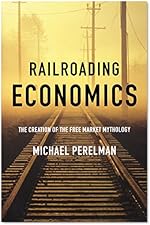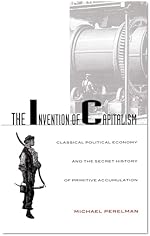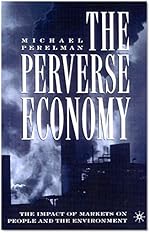An Ecological Future: Marx and Wu Wei
I have just written a short paper that I will be presenting in China. Any comments would be appreciated.
Thank you very much
I have just written a short paper that I will be presenting in China. Any comments would be appreciated.
Thank you very much
 25 – The Confiscation of American Prosperity: From Right-Wing Extremism and Economic Ideology to the Next Great Depression
25 – The Confiscation of American Prosperity: From Right-Wing Extremism and Economic Ideology to the Next Great Depression 30 – Manufacturing Discontent: The Trap of Individualism in Corporate Society
30 – Manufacturing Discontent: The Trap of Individualism in Corporate Society Class Warfare in the Information Age
Class Warfare in the Information Age Railroading Economics: The Creation of the Free Market Mythology
Railroading Economics: The Creation of the Free Market Mythology Steal This Idea: Intellectual Property Rights and the Corporate Confiscation of Creativity
Steal This Idea: Intellectual Property Rights and the Corporate Confiscation of Creativity The Invention of Capitalism: Classical Political Economy and the Secret History of Primitive Accumulation
The Invention of Capitalism: Classical Political Economy and the Secret History of Primitive Accumulation The Perverse Economy: The Impact of Markets on People and the Environment
The Perverse Economy: The Impact of Markets on People and the EnvironmentBlog at WordPress.com.WPzone.net.
i can’t accessw the paper!
It is fixed now.
Hi Michael:
Am I right that the discussion of reproduction costs stops with the end of the natural resources section?
I ask because, as perhaps the last adherent to the second contradiction thesis, it seems to me that the reproduction costs naturalized and ignored by capital also include – as you point out, but don’t stress the costs of – reproducing healthy/creative labor and – as you leave out, I think – the reproduction of public space/culture.
These phenomena – healthy ecological, personal and communal conditions – are necessary for the expanded reproduction of capital but are degraded and their healthy reproduction is impeded by its expanded reproduction. In the West, the costs of producing these three aspects of healthy production conditions are usually socialized via the state… its not clear to me what China does.
Again, in the West, struggles over their reproduction are primarily expressed as struggles of over quality/conditions of life… e.g., are struggled over in forms viewed by most participants as non-class politics and as such are viewed as liberal rather than radical… and, again, its not clear to me how this stuff would be characterized under the very different politics in China – in many ways, its an issue of democracy, of socializing the politics of reproduction along ecological, personal and communal lines, isn’t it?
Alan
I accessed it at last!
From my first impression;
=>concise and simple without being simplistic
=>however inadequate in stressing the link between Marx and (particularly) Wun Wei (if due to limitations of specified words limit, I would suggest sacrificing some elements in the stressing/elucidation on the value theory for a clearer presentation of Wun Wei and its links with Marx’s)
=>considering the topic’s focus being, I would have considered the equity question as between rights within AND BETWEEN generations as apt
=>while not of a major consideration I would have suggested maintaining the adjective of traditional/(neo-)classical or whatever, when addressing the orthodox economics (as you pointed out the force of history’s events is throwing up Marxian ECONOMICS, again; I don’t think we should implictly surrender the ground of Marxist economics being economics….)
=>something to the effect of corporatization as negating competition amounting to abandoning capitalism (not in such exact words reall; I think it was on pg 6). I would have suggested re-framing that
=>I would with all due respect think that the conclusion does not, in my view at least, aptly summarize the threads of issues addressed in the body of the paper.
Comradely regards,
BA
Micheal,
Half of “all energy withdrawals” … you don’t specify from where … do not go to turn “water into steam”. A very small percentage in fact is used in the final… ‘steam’. Water is used in power production but as a whole, other industry, agriculture, and commercial ventures use 80% of all water. Much water that is used in power production is used for cooling the turbines but it is not withdrawn on a permanent basis but is returned to the ocean, lake or river.
David Walters
Hi Michael,
The paper is interesting. I enjoyed how you pieced together the various arguments to drive home your points. However, wouldn’t it be inclusive to say “The idea that merely limiting government activity would lead either to prosperity or to freedom is a purely Western invention” (see p. 15), instead of just “European”, considering also the contribution of the vocal propopents of “small governments” in North America to the whole anti-state agenda over the years?
Fraternally,
Moses Geply
There is a revival of Marxism in China, with Marxist currents even within the Communist Party and labor movement. Foreign comrades should help sharpen the differences between opposing world views. For instance, underline the distinction between enterprise rationality and social rationality, between the need for mobilizing the collective intelligence and the danger that innovation leads to unemployment, private property in knowledge as an obstacle to socially useful innovation, and the different meanings of efficiency for different societies (e.g.seed harvested /seed sown, yield/ha., yield/labor day, energy out/energy in…Perhaps our best contribution would be in showing the unacceptability of bourgeois categories for thinking about the use of resources and labor. Buen viaje.
I am a bit surprised that there was no mention of Juan Martinez-Alier’s book *Ecological Economics* (Oxford: Basil Blackwell, 1987), since in that book, Martinez-Alier explored how Marx and later Marxists like Alexander Bogdanov and Nikolai Bukharin dealt with ecological issues.
Concerning Bogdanov, according to Martinez-Alier, his theoretical speculations laid the groundwork for what was later called general systems theory, as he concerned himself with analyzing the connections between thermodynamics and biology. He suggested a link between the study of energy flow and the principle of natural selection. In this he was influenced by Ostwald which was one reason why Lenin chose to attack Ostwald in *Materialism and Empirio-Criticism*. As Martinez-Alier
noted Bogdanov rather uncritically accepted many of Ostwald’s notions including his idea that “mental” energy is a form of physical energy. On the other hand Martinez-Alier thought that Bogdanov’s notion that it might be possible to define the forces of production in terms of energy availability to be a promising one. And unlike Lenin he saw promise in Bogdanov’s Machism.
Concerning Bukharin, Martinez-Alier points out that he devoted one chapter of his *Theory of Historical Materialism* to analyzing the relations between nature and society in which he noted that society must to survive extract material energy from its environment. The more energy it can extract from nature, the better adapted it is to its environment. Society spends the energy of human work in exchange for a quantity of appropriated natural energy.
For Bukharin the idea of an exchange of energy was a useful
way for interpreting the idea of metabolism between nature and society which enabled the process of social reproduction. As Martinez-Alier sees it Bukharin had come close to dealing with the question of whether this energy
“income” is really an income or is in fact a part of “capital.” Bukharin also presented a typology of both stable and moving social equilibrium which he he analyzed
in terms of social energetics, that is in terms of energy
flows between society and the natural environment.
Thank you to Jim Farmelant for his scholarly contribution. I was even more surprised than he was, since Michael Perelman read 20 years ago my book of 1987, Ecological Economics: Energy, Society and Environment (Blackwell, Oxford), reprinted several times.
Joan Martinez-Alier
Barcelona
I haven’t read this paper and don’t intend to, because the comments convey the thrust and sentiments of the paper quite well: yet another tedious academic preach-to-the-choir term paper that has no relevance to contemporary politics or environmental issues. People like Perelman and his fellow travelers have been, presumably, awake or at least alive for the past thirty or forty years, long enough to figure out what is going on, and long enough to recognize the irrelevance of marxism and all the other fringe ideologies around whose campfire the bearded seers sit to argue with each other and achieve absolutely nothing. These pointless intellelctual exercises have methodically denigrated or excluded the significant achievements, theoretical or actual, of other movements while ignoring what was actually happening in the world. The evidence of this lies in the brick wall theleft has erected between itself and the planet, between its soundless arguments, and between its academic studies and science. In addition, it has reacted with hostility to those movements who HAVE contributed to a meaningful analysis and critique of the forces destroying the world. I havent read this paper but I would wager that the word “ecology” is absent except by scornful dismissal.
Life is too short and the global crises too urgent to give credence, much less momentary attention, to these retrograde forces of the left.
Interesting thesis.
During the TQM fad I studied several Japanese proponents, Ishakawa whose root cause diagram I use in my work, spoke of the difference between the Japanese worker and the Western laborer.
He supposed that the application of Zen in the workplace in the form of KaiZen (Zen in the world) is a big advantage.
Basis of Zen is oneness with the work and striving to be better (Zen meaning good) as we are in the world. Work being in the world.
Also, a read of Zen and the Art of Motorcycle Maintenance, Robert Pirsig points the differences between the west and the east in approaches to the universe.
I can not access the file.
sorry. fixed again. I don’t know what the problem is. You have to click on the link and then click on the next link that appears.